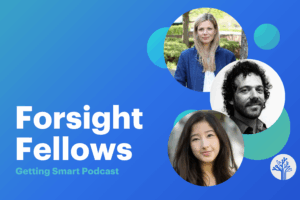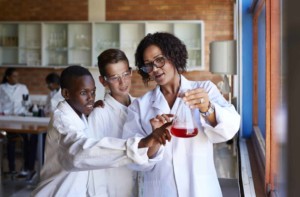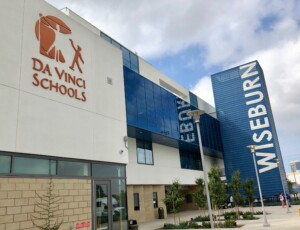5 Ways PBL Set A Clearer Vision for My Career Aspirations

By: Taylor Silveira
After graduating from High Tech High North County (HTHNC), which is a part of the High Tech High network of public – charter schools based in San Diego, California, I frequently reflect about the invaluable lessons that are unique to the project-based learning methodology.
As a first-year undergraduate student at the University of California Los Angeles, I engage in conversations with others who attended public and private high schools. Most students are indecisive about choosing their major when they begin college, lacking information about themselves and their career paths.
Students are forced through the K-12 traditional curriculum in which academic mastery is achieved through test-taking and have much less time to pursue their own interests, instead, focusing on improving their ability to retain and regurgitate information for taking tests. Students’ time is consumed with busy work and following instructions. Students’ educational endeavors are narrowed down to a competitive based grading system, ranking a student’s performance in comparison to their peers.
High achieving students obtain great pride from shallow achievements, such as enrolling in many honors and Advanced Placement courses and earning A’s. If the implied message of our schooling system is: “if you follow instructions and do exactly as you are told,” kids who embody this will abandon developing responsibility and self-direction in their own education.
There is a necessity for the implementation of project-based learning, a curriculum design that allows for a framework with expected learning outcomes, within that design, students can achieve these outcomes by incorporating their areas of specific interest to pursue.
Many proponents of PBL in education often reevaluate how to best define common sense in academia that prepares students to pursue meaningful careers, combined with developing the appropriate skill set that benefits the economy of tomorrow. In the world of education today, pragmatic content, strategies, and guidance that’s in correlation with the realities of the workforce isn’t being imposed.
1. Learning environment that embraces failure and continues despite it
At High Tech High, when the final product for a project wasn’t completed on time or executed correctly, we would circle back to elaborate clearly on our incompetencies through the reflection process. Failure is inevitable throughout an individual’s life if the purpose of education is to learn then experiencing a lack of success is essential towards improvement.
In traditional schooling, students are taught strategies focused on preventing failure from occurring. Yet the innovation-based economy needs creative, out of the box thinking citizens to produce quality work. Innovation is derived from the process of constant trial and error to problem solve through creation. Project-based learning adopts John Dewey’s educational philosophy of failure and pragmatism, that is “failure is instructive. The person who really thinks learns quite as much from his failures as from his successes.”
2. Integrated learning curriculum
For students to answer complex questions about our world, it’s important to make connections between core academic subjects and their relation to personal experiences. Interdisciplinary understanding fuses English, history, art, science, math, and language together. The world doesn’t consequently solve problems in a discipline-specific manner. In a project-based learning setting, you can analyze the diverse sets of inquiry and methods each subject offers. Combining the approaches towards solving problems through the lens of a scientist, historian, or artist’s perspective allows for designing real-world projects that have a lasting impact.
In my coursework and involvement with organizations and companies, I understand the purposeful crossover in skills and knowledge associated with each of these steps that are taken.
3. Engaging in depth over breadth on important concepts and issues
Incorporating deeper learning is essential to project-based learning, placing an emphasis on thinking more than knowing. In order to truly learn something, it must be accomplished by the act of doing. Consuming information to prepare for a test and receive a decent grade is one proposition, nonetheless, if a student is tasked with creating something of value and importance it cultivates a “sense of satisfaction.” When depth is encouraged students can exercise their ability to think and tackle some of our most pressing issues. Students can build on research skills and strengthen their learning of the applied content which goes beyond memorizing information and facts.
4. Development of soft skills in a technical world
Ethics of oral communication that sets organizations and companies up for success relates to employees’ proficiency in soft skills. In a high-tech world, project-based learning addresses the soft skills that are lacking and in high demand, including conveying poor performance, understanding motivations, listening, talking straight, and sharing perspectives. Students have ideas that capture their attention and delve more into this by learning and doing. However, the ability to communicate and articulate the ideas and data in a way that’s understandable to others is crucial — especially to those who could use and apply that information.
5. Academic internships and work experience Throughout my time spent at High Tech High, students were encouraged to pursue internship opportunities. Students would often sort out their career interests efficiently because they were on the ground. Lessons that are integral in project-based learning can be transferred to performance tasks joined with real-world careers. Workplace experience complements your coursework and provides another avenue of learning. These experiences in the professional world can even lead to paid internships/jobs with respectable companies after graduating high school as it did so for me.
Project-based learning engages students in the journey of learning through attempting to solve real-world problems through research, comprehension, presentation, and collaboration skills. Students are called to have authentic thought, reflection, and questions to produce meaningful work. We need to equip citizens with 21st-century skills where people can work together to achieve a common goal and “make a difference.”
For more, see:
- Communicating with You Teacher Will Never Be the Same
- How to Set Middle Schoolers on a Long-Term Path of Success
- Smart Review: Better Voice Recognition with Soapbox Labs
Taylor Silveira is a student at UCLA and the founder of UCLA’s Women in Tech. Follow her on Twitter.
Stay in-the-know with innovations in learning by signing up for the weekly Smart Update.






0 Comments
Leave a Comment
Your email address will not be published. All fields are required.